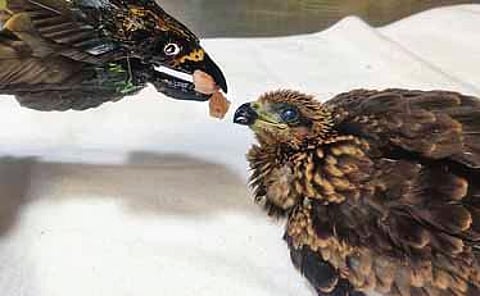

BENGALURU: While there is no substitute for mother’s love, in times of crises, some technology sprinkled with compassion, might make a big difference. In what is seen as a revolutionary step in the country’s wildlife care sector, a city-based NGO has developed a prosthetic device that can feed orphaned nestlings, giving them a new lease of life.
On March 5, People for Animals (PfA), Bengaluru, rescued a kite nestling, which had fallen from its nest and separated from its mother. In a bid to feed it, PfA shelter curator Karthik Prabhu devised the tool -- which is made of kite feathers with a beak at the end, thus replicating the mother. The mother kite’s sounds are also played in the background while feeding it.
“We don’t want animals to depend on humans for food, which can lead to human-animal conflict. We also want the nestling to feel its mother’s presence while it’s being rehabilitated,” said Col Dr Navaz Shariff, chief veterinarian and general manager, PfA.
Although they have developed a feeder only for black kite nestlings at the moment, Karthik said they are planning similar tools to help feed other wild birds and animals too. “We also plan to create such feeders for aquatic birds and macaques,” he said, adding that while they rescue nestlings in various conditions demanding different ways to be cared for, the feeder needs to be customised accordingly.
On March 6, Central Zoo Authority, New Delhi, a statutory body of the Ministry of Environment, Forest and Climate Change, shared a video of the device on its Twitter handle. Gowri Mallapur, veterinary consultant at CZA, said, “This technique has been used globally for a while now to prevent imprinting. However, the technology is species-dependent and avoiding imprinting is just one of the many considerations. One needs to do much more than feeding.”